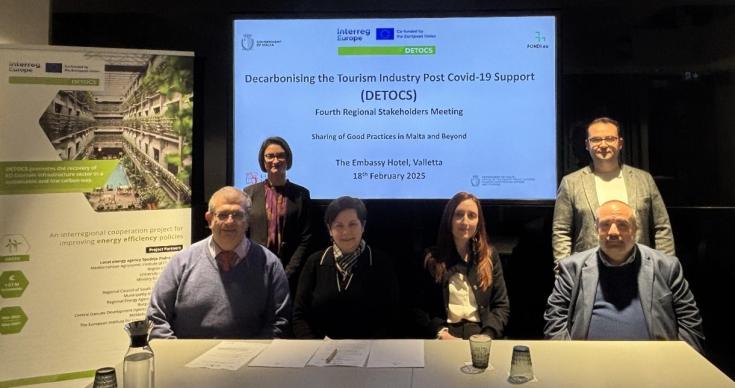Fourth Regional Stakeholders Meeting - Malta
All tourism stakeholders were invited to the fourth regional stakeholders’ meeting held on 18th February 2025 at the Embassy Hotel, Valletta.
The following entities attended the event:
- Ministry for Foreign Affairs and Tourism
- University of Malta
- Malta Tourism Authority
- Malta Tourism Observatory
- Climate Change Authority (CAA)
- Institute for Climate and Sustainable Development
- Ministry for Gozo and Planning (MGP)
- Office of the Prime Minister – EU Funds, Equality, Reforms and Social Dialogue (OPM-EES)
- Planning Authority (PA)
The aim of the event was to provide a platform for local tourism stakeholders to learn about and discuss relevant good practice examples identified at project level, and to propose other potential good practices from Malta which could be reported and eventually published on the Interreg Europe Good Practice Example platform.
The event consisted of two parts. Following a brief introduction on the aims of the DETOCS project, the first part included three presentations:
- The first presentation focused on the EU Transition Pathway for Tourism document, which serves as a guide for European tourism stakeholders in the transition towards a more sustainable and responsible tourism industry.
- The second presentation summarised the good practice examples presented by partner members during the Interregional Meeting held in Chania, Crete. These were shared with local stakeholders to facilitate learning and exchange of experiences.
- The third presentation highlighted Malta’s first identified good practice example: the Energy & Water Agency's GUEST project. This initiative supports guesthouse owners and users in adopting a more sustainable pathway. It reported on the outcomes of the two-year project, particularly the free energy and water audits carried out for participating guesthouses. The project identified key energy and water efficiency measures and implemented simple solutions that resulted in immediate reductions in carbon dioxide emissions. Furthermore, some guesthouse participants were able to benefit from existing fiscal support schemes to implement audit recommendations, thanks to the sponsorship provided by the GUEST project.
Following a short break, the second part of the event involved group discussions. The key question posed was:
“Kindly share any past or planned good practice examples in energy efficiency and renewables applied in the tourism sector in Malta by highlighting: a brief description of the initiative, rationale for the measure, implementation and challenges, key performance indicators for success, positive impact results, and potential for replication.”
The main results were as follows:
Group Discussion No. 1:
Some of the potential good practices identified in Malta included:
- The Ship-to-Shore project, which provides direct electricity to cruise liners at berth, allowing them to switch off their polluting heavy fuel oil generators.
- The Valletta Design Cluster, a state-of-the-art deep renovation project on a historic building in Valletta, featuring various energy efficiency measures and a roof garden. Similarly, the National Contemporary Arts Museum (MICAS) was identified as another good example of sustainable renovation of historic buildings.
- The Malta Sustainable Tourism Awards, which will be held for the first time this spring, aiming to honour tourism entities that place a strong emphasis on sustainability in their operations.
Group Discussion No. 2:
The main good practice identified by this group was the Tourism Sustainability Indicators (TSI) project, coordinated by the Malta Tourism Observatory. It was noted that the Malta Tourism Authority (MTA) is the lead partner on the TSI project, while the National Statistics Office is the lead for the Tourism Satellite Account (TSA) project.
As part of the TSI initiative, 37 sustainable tourism indicators have been identified through consultations with stakeholders and expert input. To date, 29 of these indicators can already be calculated. The TSI project is still ongoing and progressing well. These indicators will serve as benchmarks to support the implementation of a sustainable tourism strategy for Malta.

